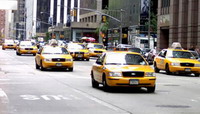Taxi and Limousine Commission introduces new technology
New York's Taxi and Limousine Commission is going to install touch-screen monitors in all 13,000 city cabs in spite of objections of some drivers who consider the technology too expensive and intrusive.

The monitors, already in 200 cabs as an experiment, allow riders to pay by credit card, map out where the cab is going and find information about restaurants and bars.
Taxi officials say the monitors will help passengers make the most of the 13 minutes they spend on an average ride in the city. But many drivers have decried the cost - up to $7,400 (5,470 EUR) for equipment and fees over three years - and say the technology will let taxi owners and officials check up on them.
"I cannot afford the computer. What is going to happen to me?" driver Oscar Luzzi said at Thursday's commission meeting.
TLC Commissioner Matthew Daus said the monitors could help drivers, giving them information about traffic while boosting ridership by eliminating the need for cash.
"This project is nothing short of revolutionary and evolutionary for the taxi industry," Daus wrote in a recent agency newsletter. He noted the commission had called for the technology while approving a 26 percent fare increase in 2004.
The commission set an Aug. 1 deadline to chose a system and said that starting Oct. 1, as taxis come up for inspection, they will be required to have the technology.
The issue has a delicate history: A 2003 experiment with touch-screen television in taxis ended within months amid passenger antipathy, and the drivers' group leading the opposition to the monitors notes that it carried out a crippling taxi strike over other issues in 1998.
The credit-card option is expected to prove popular with customers, though, in what is now a mostly cash, $1.8 billion (1.33 billion EUR)-a-year business.
The global positioning system in the technology, from Englewood, New Jersey-based TaxiTech, automates required record-keeping. It could help with lost items, as well: If a customer reports losing a wallet, the taxi commission could send alerts to drivers in the neighborhood where the customer was dropped off to be on the lookout.
Objecting drivers have raised concerns about the costs of the technology, credit-card fees and potential working time lost if it needs repair. Some worry that the global-positioning system will be used to track their movements, although the taxi commission says it will record only the pickup and drop-off points and fare, which drivers already are required to log.
"It's trampling on our constitutional rights, and it will cut deeply into our income," said Bill Lindauer of the New York Taxi Workers Alliance, a drivers' advocacy group with more than 7,000 members.
The alliance held a rally in March to protest the systems, and Lindauer said it was exploring legal and political avenues to block the plan.
Subscribe to Pravda.Ru Telegram channel, Facebook, RSS!





